|
|
|
Sort Order |
|
|
|
Items / Page
|
|
|
|
|
|
|
| Srl | Item |
| 1 |
ID:
144271


|
|
|
|
|
| Summary/Abstract |
The way that water is entangled with broader social relations has become a prominent concern in political ecology, geography and beyond. Employing the concept of the hydro-social cycle highlights how water is produced by, and simultaneously constitutes, social and power relations. Applying and expanding the hydro-social cycle as an analytical lens, this paper explores the contestation of different discourses of water. Looking at the conflict over the construction of a proposed dam in Chile, we examine different meanings given to water to understand how these produce uneven power relations with material and symbolic implications. By teasing out the workings and contestations of this conflict as a hydro-social cycle, we aim to highlight the diverse range of elements enlisted in it beyond water, to expose its complexity and to search for more just and inclusive alternatives.
|
|
|
|
|
|
|
|
|
|
|
|
|
|
|
|
| 2 |
ID:
144274
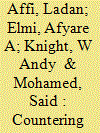

|
|
|
|
|
| Summary/Abstract |
Employing secondary research and semi-structured interviews, this article examines the use of private maritime security companies (PMSC) in providing maritime security services in the Horn of Africa. It consists of four parts. The first part explains the origins and development of the use of PMSC in the Horn of Africa. The second section discusses the regulation of the private security industry, paying particular attention to the maritime context. Part three examines the challenges associated with the use of maritime PMSC in the Horn of Africa, including negative human rights implications, compromising the innocent passage of commercial ships, and creating confusion in the hierarchical control of ships. Finally, the paper analyses the findings and concludes that PMSC, despite their apparent short-term effectiveness, cannot be regarded as a long-term solution to the piracy phenomenon in the Horn of Africa.
|
|
|
|
|
|
|
|
|
|
|
|
|
|
|
|
| 3 |
ID:
144265
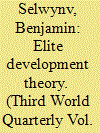

|
|
|
|
|
| Summary/Abstract |
Much development theory is based upon elite-led conceptions of social change. Elite development theory (EDT) conceptualises ‘the poor’ as human inputs into or, at best, junior partners within elite-led development processes. This elitism contributes to the continual (re)framing of the poor as passive beneficiaries of elite policy, and legitimates economic exploitation of the poor. These claims are illustrated by discussing a number of EDT traditions – the Washington/Post-Washington Consensus, statist political economy, modernisation Marxism and varieties of pro-poor growth. As an alternative to EDT the article argues for a conception and practice of ‘labour-centred development’.
|
|
|
|
|
|
|
|
|
|
|
|
|
|
|
|
| 4 |
ID:
144266
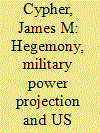

|
|
|
|
|
| Summary/Abstract |
Positing the dawning of a ‘post-American World’, ‘declinists’ have taken little account of the USA’s surging interventionist tendencies and the new political economy of military power arising from the relentless pursuit of global militarism. The USA has long exercised its competitive advantage in military power to enhance its diplomatic clout, as well as to advantageously reposition its national industrial and financial base. The pace of such martial efforts has accelerated as US policy makers, employing a ‘deep engagement’ grand strategy, strive for paradigm maintenance and geopolitical expansion within the periphery. Interventions have been facilitated through new processes and procedures, carefully constructed to create a sufficient degree of autonomy to permit the US state to ‘project power’ without broad societal resistance. US policy is path-dependent, locked into a reflexive pattern, unable and unwilling to learn from its long string of blunders and delusionary adventures. But US policy makers do not suffer a loss of will-to-power, as neo-conservatives allege.
|
|
|
|
|
|
|
|
|
|
|
|
|
|
|
|
| 5 |
ID:
144264
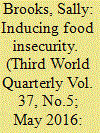

|
|
|
|
|
| Summary/Abstract |
The G7 ‘New Alliance for Food Security and Nutrition’ follows an established approach of ‘connecting smallholder farmers to markets’, while extending the role and influence of corporate agri-business in new ways. This paper explores the implications of the ‘New Alliance’ model’s incorporation into the Sustainable Development Goals framework for smallholder producers already facing greater uncertainty in financialised agri-food chains, and in light of a consensus around the primacy of private finance in the post-2015 era. The question for alternative food and development movements is how to confront the ‘value chain challenge’ in an increasingly financialised global agri-food system.
|
|
|
|
|
|
|
|
|
|
|
|
|
|
|
|
| 6 |
ID:
144273
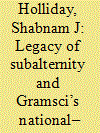

|
|
|
|
|
| Summary/Abstract |
Drawing on Laclau’s concept of populist discourse and Gramsci’s ‘national–popular collective will’, and using the case of Iran, this article puts forward the idea of the legacy of subalternity in the context of post-revolution governments. The concept of ‘national–popular collective will’ facilitates an understanding of how the popular subject is constructed and the meanings embedded in that process. It is argued that Islamic Republic elites articulate a populist discourse that constructs the ‘self’ (the Islamic Republic) as synonymous with ‘the people’. Embedded in this discursive construction is a legacy of subalternity that goes back to the 1979 Revolution’s populist discourse.
|
|
|
|
|
|
|
|
|
|
|
|
|
|
|
|
| 7 |
ID:
144268
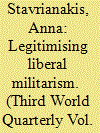

|
|
|
|
|
| Summary/Abstract |
Post-cold war efforts to knit together human rights and international humanitarian law in pursuit of tougher arms transfer control reached their apogee in the UN Arms Trade Treaty (ATT). In contrast to dominant accounts based on human security norms, I argue that a key effect of the ATT is to legitimise liberal forms of militarism. During negotiations the US and UK governments justified their arms export practices in terms of morality, responsibility and legitimacy. More broadly their arms transfer practices are explained away by reference to national regulatory regimes that exceed the standards set out in the ATT. Arms transfers to Egypt and intra-Western transfers illustrate the way these justifications and regimes serve to shield US–UK weapons transfers and use from scrutiny and accountability. Rather than signalling the victory of human security, the ATT is better understood as facilitating the mobilisation of legitimacy for contemporary liberal forms of war fighting and war preparation.
|
|
|
|
|
|
|
|
|
|
|
|
|
|
|
|
| 8 |
ID:
144267
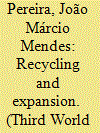

|
|
|
|
|
| Summary/Abstract |
This article analyses the agenda of the World Bank after the Washington Consensus, arguing that it became more encompassing, politicised and intrusive. This agenda expanded and recycled itself since, in addition to liberalisation, privatisation and macroeconomic adjustment, it also advocated the wide-ranging reconstruction of the economy, the relationship between society and nature, the state, civil society and visions of the world and social practices from a neoliberal perspective. It is argued that the fight against poverty was incorporated by the institution, which functioned as an auxiliary mechanism for this liberalisation. The importance of the incorporation of New Institutional Economics for this expansion and recycling is highlighted.
|
|
|
|
|
|
|
|
|
|
|
|
|
|
|
|
| 9 |
ID:
144272


|
|
|
|
|
| Summary/Abstract |
Biofuels are a growing alternative energy source. In a context of their growing global consumption, Brazil has shown particular interest in the European market. This paper analyses Brazilian foreign policy on biofuels towards the EU during Lula da Silva’s administration (2003–10). It examines the emergence of biofuels at a global level, the main guidelines of Brazilian foreign policy, Brazilian environmental foreign policy and, finally, the Brazilian political response to changes in European law.
|
|
|
|
|
|
|
|
|
|
|
|
|
|
|
|
| 10 |
ID:
144263
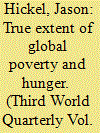

|
|
|
|
|
| Summary/Abstract |
The final report on the Millennium Development Goals (MDGs) concludes that the project has been ‘the most successful anti-poverty movement in history’. Two key claims underpin this narrative: that global poverty has been cut in half, and global hunger nearly in half, since 1990. This good-news narrative has been touted by the United Nations and has been widely repeated by the media. But closer inspection reveals that the UN’s claims about poverty and hunger are misleading, and even intentionally inaccurate. The MDGs have used targeted statistical manipulation to make it seem as though the poverty and hunger trends have been improving when in fact they have worsened. In addition, the MDGs use definitions of poverty and hunger that dramatically underestimate the scale likely of these problems. In reality, around four billion people remain in poverty today, and around two billion remain hungry – more than ever before in history, and between two and four times what the UN would have us believe. The implications of this reality are profound. Worsening poverty and hunger trends indicate that our present model of development is not working and needs to be fundamentally rethought.
|
|
|
|
|
|
|
|
|
|
|
|
|
|
|
|
| 11 |
ID:
144270


|
|
|
|
|
| Summary/Abstract |
This article reconsiders the hegemonic interpretation of Latin American regionalisms, which have been defined as expressions of the fragmentation power of ideologies. After identifying the main bias and limitations of this approach, two alternative analytical proposals are presented: critical International Political Economy (IPE), which reconsiders the region’s heterogeneity as the reflection of a variety of historical trajectories; and the increasingly influential Latin/Latin American modernity/coloniality approach, which re-authorises the voices of a multiplicity of ‘marginal’ subjectivities to the cognoscible world of international studies.
|
|
|
|
|
|
|
|
|
|
|
|
|
|
|
|
|
|
|
|
|